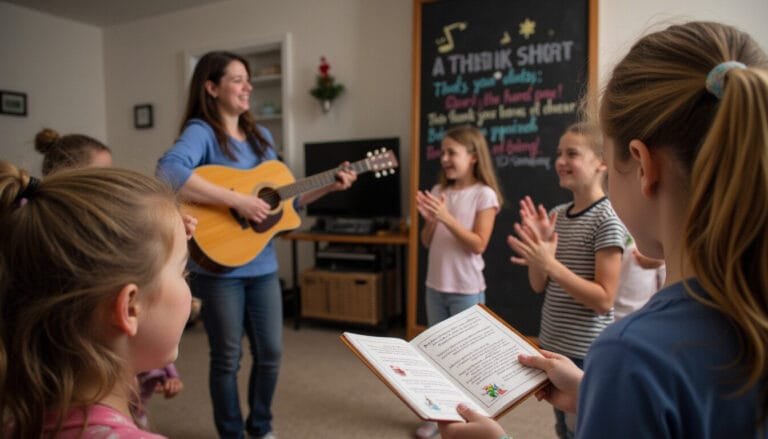In a world bustling with distractions and competing values, the importance of establishing a spiritual foundation during childhood can often be overlooked. Yet, it is in these formative years that children are most receptive to understanding the deeper questions of life — questions about purpose, connection, and love. By nurturing their faith, we not only equip them with the tools to navigate life’s challenges but also foster a sense of belonging and inner peace that will guide them well into adulthood. Just as we wouldn’t build a house without a strong foundation, our children’s spiritual lives deserve the same careful attention.
The benefits of nurturing faith are profound and far-reaching. Spirituality instills core values like compassion, integrity, and resilience, shaping a child’s character and guiding their decisions. It creates a safe harbor for them to explore their feelings, ask difficult questions, and develop empathy towards others. As parents and guardians, we have the unique opportunity to weave spirituality into the very fabric of our daily lives through intentional parenting strategies. Imagine the joy of watching your child grow into a confident individual who understands the significance of kindness, gratitude, and hope. This journey towards building a robust spiritual foundation can be both fulfilling and transformative — not just for our children, but for us as families too. Join me as we explore practical ways to cultivate faith in our little ones and embark on this beautiful adventure together!
Understanding Spirituality
When we talk about spirituality for children, we’re diving into a beautiful realm where curiosity meets the heart. Spirituality can be understood as the inner journey of seeking meaning, purpose, and connection with something greater than ourselves. For children, this often manifests in their wonder about the world, their empathy toward others, and their ability to appreciate the little things in life, like a colorful sunset or a butterfly’s dance. By nurturing this sense of child spirituality, we help lay a strong spiritual foundation that will guide them through the complexities of life.
It’s essential to distinguish between religion and spirituality as they are not synonymous. While religion often involves structured beliefs, rituals, and community practices — think Sunday school or holiday celebrations — spirituality is more fluid and personal. It encompasses the individual’s relationship with faith, values, and the universe around them. For instance, a child may attend a religious service but also find spirituality in nature during a family hike, marveling at the intricacies of creation. By recognizing and supporting both aspects, parents can help children appreciate the richness of spirituality without feeling confined by rigid definitions.
As children explore their spiritual side, they begin to develop their values — compassion, gratitude, respect, and love. These values serve as guiding principles in their interactions with peers, family members, and even strangers. Imagine a child who learns to practice gratitude by acknowledging the kindness of others; this simple act can cultivate an empathetic mindset that influences their relationships for years to come. When spirituality is woven into the fabric of a child’s upbringing, it can profoundly shape their character and decision-making abilities, equipping them with tools to navigate life’s challenges with grace and resilience.
Incorporating these ideas into daily conversations can be as simple as discussing what they are thankful for at dinner or sharing stories of kindness they witnessed during the day. These moments not only reinforce the importance of child spirituality but also invite children to reflect on their experiences and feelings. Ultimately, fostering an understanding of spirituality helps children build a solid foundation that will support them throughout their lives, encouraging them to remain curious and compassionate seekers of truth and connection.
Incorporating Faith into Daily Life
In the tapestry of daily life, weaving in simple rituals can create a rich spiritual fabric that supports your child’s faith journey. Imagine starting each day with a brief moment of mindfulness — perhaps lighting a candle or sharing a short Bible verse. This quiet time can serve as a gentle reminder of the values you cherish and set a positive tone for the day ahead. Children thrive on routine, and by integrating these small faith activities into their mornings or evenings, you help them cultivate a sense of peace and purpose.
Prayer plays a pivotal role in nurturing spirituality in children. Encourage your little ones to express their thoughts and feelings through prayer, whether it’s a heartfelt plea for a friend or a simple thank you for the day’s blessings. You might even consider creating a “prayer jar,” where family members can drop in their prayer requests throughout the week, transforming prayer time into a shared family activity. This not only reinforces the importance of connecting with God but also teaches children about community and support. As they grow, these moments of communication with the divine can become a treasured part of their daily routine.
Another beautiful way to deepen your child’s spiritual understanding is by fostering an attitude of gratitude. Encourage them to keep a gratitude journal where they can jot down things they are thankful for each day. This practice not only enhances their appreciation for life’s blessings but also instills a sense of humility and joy. You could make it a fun evening ritual where the whole family gathers to share what they are grateful for, creating a warm atmosphere filled with love and reflection. These little faith activities help children recognize the abundance in their lives and develop a lasting habit of gratitude.
By incorporating these simple yet profound practices into daily life, you lay a strong foundation for your child’s spiritual growth. Each moment spent in reflection, prayer, and gratitude enriches their understanding of faith and nurtures their relationship with God. Remember, these building blocks will not only guide them today but will also serve as guiding lights on their journey toward adulthood.
Engaging in Faith-Based Activities
Creating a rich spiritual foundation for your child goes beyond daily rituals; it flourishes through engaging family activities that invite exploration and connection. Consider setting aside time each week for a family project that emphasizes faith, such as volunteering at a local food bank or participating in community clean-up days. These experiences not only strengthen your family bond but also instill in your children the importance of compassion, service, and being an active member of their community. When children witness their parents embodying these values, they learn that faith is not just a set of beliefs but a way of life that encourages us to care for others.
Celebrating religious holidays provides another wonderful opportunity to deepen your child’s understanding of faith. Rather than simply observing traditions as mere customs, turn these moments into teaching opportunities. For example, during Passover, you might incorporate storytelling about the significance of the holiday while preparing traditional meals together. Or, during Advent, create a calendar that includes acts of kindness for each day leading up to Christmas. This approach not only makes the holidays memorable but also reinforces the values behind them, giving your children a tangible sense of their faith’s significance.
Family rituals play a crucial role in this process, serving as anchors in the often chaotic world we live in. Try establishing a weekly “Faith Night,” where you gather to discuss spiritual themes, read religious stories, or even create art inspired by your beliefs. These rituals can be simple yet profound, providing a safe space for your children to express their thoughts and feelings about faith while fostering an environment of open dialogue. As they share their insights, they begin to weave their understanding of spirituality into the fabric of their daily lives.
Lastly, don’t forget to involve your local faith community in these activities. Engaging with others who share similar values can amplify your child’s spiritual growth. Attend family-friendly events at your church or community center, and encourage friendships with peers who support their journey of faith. Together, you and your child can explore the beauty of shared beliefs and experiences, further enriching their spiritual foundation and creating lasting memories along the way.
Open Discussions about Faith
Encouraging open discussions about faith is essential for nurturing a child’s spiritual growth. Children are naturally curious, often asking profound questions that can sometimes catch us off guard. Instead of brushing these inquiries aside or giving them vague answers, embrace their curiosity! For instance, if your child asks why people believe in God, seize the moment to explore the topic together. Use this opportunity to discuss various perspectives and share your own beliefs, fostering an environment where they feel comfortable seeking answers. By encouraging questions about spirituality and religion, you help them develop critical thinking skills while deepening their understanding of faith.
Creating a safe space for children to express doubts is just as vital. Children may grapple with uncertainties about their beliefs, especially when exposed to diverse viewpoints in school or social settings. Let them know that it’s perfectly normal to have questions and that exploring these doubts can lead to stronger convictions. Consider setting aside time during family dinners or car rides to discuss faith openly. You might say something like, “It’s okay if you’re not sure about certain things; let’s talk about it.” This approach not only validates their feelings but also fosters a trusting relationship where they feel supported in their spiritual journey.
Sharing personal faith experiences can effectively enrich these discussions. When you recount your own moments of doubt or revelation, it humanizes the faith journey and shows that even adults wrestle with belief. Perhaps you could share a story about a challenging time when prayer brought you peace or how a community event strengthened your faith. Such anecdotes can resonate deeply with children, providing relatable examples that spark further conversation. Remember, the goal is not to impose your beliefs but to guide them gently as they navigate their spiritual path.
In essence, fostering open discussions about faith equips children with the tools they need to explore their spirituality authentically. By actively encouraging questions, creating a safe space for doubt, and sharing personal stories, you pave the way for a healthy, lifelong relationship with faith — one that encourages them to seek understanding and find their own unique connection with the divine.
Utilizing Stories and Teachings
Stories have an incredible power to shape our understanding of the world, especially for children. When it comes to building a spiritual foundation, parables and religious narratives serve as vibrant tools that can illuminate complex ideas in a way that is both relatable and memorable. Take, for instance, the parable of the Good Samaritan. Through this story, children can grasp the importance of kindness and compassion across cultural boundaries, fostering a sense of empathy that forms the bedrock of their relationship with God and others. By sharing such stories during family time or bedtime, parents can spark meaningful conversations that deepen their child’s understanding of faith.
To further enrich your child’s spiritual journey, consider introducing age-appropriate books and resources about faith. Picture books that illustrate biblical stories can captivate young minds, while chapter books can provide deeper insights as they grow older. For example, “The Jesus Storybook Bible” beautifully recounts the life of Christ in a way that resonates with children, highlighting God’s love and the overarching narrative of redemption. Encouraging your child to read and explore these texts not only broadens their knowledge but also reinforces the lessons embedded within those stories — lessons about love, forgiveness, and hope.
Additionally, religious teachings offer a treasure trove of wisdom that can be made relevant to children’s lives. For instance, the golden rule — treat others as you wish to be treated — serves as a guiding principle that can help children navigate friendships and social interactions. You can use everyday situations, like resolving conflicts or sharing toys, to illustrate how these teachings apply in real life. By weaving together stories and teachings in a way that resonates with their experiences, you help cultivate a resilient faith that encourages them to develop their own relationship with God, grounded in understanding and compassion.
Incorporating these elements into your child’s daily life not only fosters spiritual growth but also strengthens your family’s bond. As you share stories, discuss their meanings, and relate them to everyday situations, you create a nurturing environment where faith can flourish. This approach not only enhances your child’s understanding but also instills a lifelong love for learning about spirituality, equipping them with the tools they need to navigate life’s challenges with grace and faith.
Leading by Example
As parents and guardians, we hold a unique position in our children’s lives — one that comes with the incredible responsibility of shaping their beliefs and values. Modeling spiritual behavior is one of the most powerful ways we can influence their understanding of faith. Children are like sponges, absorbing everything around them, and they often look to us for guidance on how to navigate their own spiritual journeys. When we actively practice our faith, whether through prayer, participation in religious education, or simply living out our values in everyday situations, we provide a tangible example of what a life rooted in spirituality looks like.
Authenticity is key in this process. It’s essential that our spiritual practices feel genuine and resonate with our true selves. If children sense that we’re merely going through the motions, they may struggle to connect with faith on a deeper level. For instance, if family prayers become a rushed obligation rather than a heartfelt conversation with God, children might view faith as something insincere or irrelevant. Instead, let’s create moments where we share our hopes and concerns during prayer, inviting our children to do the same. This openness not only fosters a nurturing environment but also teaches them that faith is a personal journey filled with ups and downs.
Moreover, our children are keen observers. They watch how we respond to challenges, interact with others, and express gratitude. Every small act of kindness or moment of reflection can leave a lasting impression. For example, when faced with difficulties, if we turn to our faith for strength — perhaps by discussing a relevant scripture or story — it reinforces the idea that faith is a source of comfort and guidance. This modeling helps children understand that spirituality isn’t just about attending church or reading religious texts; it’s about integrating those teachings into our daily lives and allowing them to inform our choices and behaviors.
In essence, as we lead by example, we’re not just imparting knowledge; we’re crafting an environment where faith becomes an intrinsic part of who they are. By embodying the principles of our beliefs authentically and consistently, we nurture a rich soil where seeds of spirituality can grow, guiding our children toward a lifelong relationship with their faith.
Building a Supportive Community
Finding a faith community that aligns with your values is one of the most impactful steps you can take in nurturing your child’s spiritual foundation. When you seek out a community that resonates with your beliefs, you provide your child with a safe haven where they can explore their spirituality alongside others who share similar values. This sense of belonging not only reinforces their faith but also fosters friendships that are grounded in mutual support and understanding. Whether it’s through local churches, youth groups, or spiritual gatherings, being part of a community helps children see that they are not alone on their journey of faith.
Mentors and spiritual leaders play a vital role in a child’s life, serving as guiding lights as they navigate their spiritual path. Imagine a wise elder from your faith community taking the time to share stories of resilience and hope, or a youth leader who encourages your child to ask questions and explore their beliefs without judgment. These mentors can inspire your child to deepen their understanding of faith while providing them with practical guidance and encouragement. The relationships they build with these figures can have lasting effects, shaping their values and helping them develop into compassionate individuals.
Moreover, encouraging friendships that support spiritual growth is essential for creating a nurturing environment. Children learn best through relationships, and friendships formed in faith-based contexts can reinforce the values you instill at home. For example, organizing playdates or group activities with families who share your beliefs can provide opportunities for your child to engage in meaningful discussions about faith. This not only solidifies their spiritual foundation but also allows them to see faith lived out in diverse ways through the experiences of their friends.
As parents, it’s important to actively facilitate these connections and be open to the friendships that blossom within your community. By doing so, you help your child cultivate a network of support that nurtures their faith and encourages them to explore their spirituality with confidence and curiosity.
Overcoming Challenges in Faith Development
As children grow, it’s natural for them to experience skepticism or a lack of interest in spirituality. This phase can be disconcerting for parents who desire to nurture a strong faith foundation. Instead of viewing skepticism as a setback, embrace it as an opportunity for growth and dialogue. When your child questions beliefs or expresses doubt, create an open environment where curiosity is welcomed. Engaging in thoughtful conversations allows you to explore their concerns together, turning potential conflicts into moments of learning. For instance, if your child wonders why bad things happen to good people, use this question as a springboard to discuss concepts like free will and the complexities of faith, helping them develop a deeper understanding of spirituality.
Navigating differences in beliefs within families can also present challenges on the journey of spiritual growth. Perhaps one parent holds a strong religious conviction while the other approaches spirituality with more flexibility. In such cases, it’s crucial to foster a respectful dialogue that honors both perspectives. Consider celebrating the diversity of beliefs within your home by introducing traditions from each viewpoint during family gatherings. This not only enriches your child’s spiritual experience but teaches them the values of tolerance and respect for differing opinions. By modeling acceptance and understanding, you’re laying the groundwork for your child to develop their unique belief system while appreciating the beauty of diversity in faith.
Fostering resilience in faith is key to overcoming these challenges. Teach your child that doubt does not equate to weakness; rather, it can be a vital part of their spiritual journey. Encourage practices that cultivate resilience, such as keeping a journal of their thoughts and feelings about faith or engaging in community service projects that align with their values. These activities not only reinforce their connection to spirituality but also provide a sense of purpose and belonging. When children see how their actions positively impact others, they often find renewed inspiration and motivation for their own spiritual growth.
In conclusion, navigating the complexities of faith development requires patience, openness, and creativity. By addressing skepticism, honoring diverse beliefs, and fostering resilience, you empower your child to cultivate a robust and lasting relationship with spirituality. Remember, each challenge they face is an opportunity to deepen their understanding and commitment to their faith journey — a beautiful building block for their future.
Embracing the Journey of Faith
As we conclude our exploration of the building blocks of faith for your child’s future, it’s vital to remember just how essential a spiritual foundation is in shaping their character and guiding their choices. By nurturing their spiritual growth, you are not only equipping them with values that will serve them throughout their lives but also inviting them into a deeper relationship with faith that can bring comfort, strength, and purpose. Each moment spent weaving spirituality into the fabric of daily life is a precious investment in their emotional and moral development.
So, dear parents and guardians, take those proactive steps to engage with your children on this beautiful journey of faith. Share stories, participate in rituals, and encourage open discussions — these simple acts can make a profound difference. Remember, nurturing a lifelong relationship with faith is a continuous process filled with love, patience, and exploration. Together, let’s create a safe and supportive environment where our little ones can flourish spiritually, growing into compassionate individuals who carry their faith with them wherever they go. Your commitment to this journey is truly a gift that will bless not only their lives but also the world around them.
Affiliate Disclosure: This post may contain affiliate links. If you purchase through these links, I may earn a small commission at no extra cost to you.
Thank you for supporting Little Lights Bible Stories!





